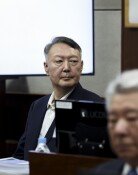China-UK situation reversed in 137 years since Opium Wars
China-UK situation reversed in 137 years since Opium Wars
Posted September. 24, 2015 06:40,
"We want a golden relationship with China that will help foster a golden decade for this country. We want to make the U.K. China`s best partner in the West. British finance minister George Osborne is seeking a closer bilateral economic relationship with Beijing.
Speaking at the Shanghai Stock Exchange on Tuesday during his five-day visit to China, Britain`s Chancellor of the Exchequer voiced support for the Chinese government`s response to plunging stock prices. In our estimation the spillover effects, the impact of that on other financial markets, has been relatively limited, he said. I want to see our stock markets in London and Shanghai formally connected, with UK firms raising funds from Chinese savers, and Chinese firms listing in London. In response, the People`s Bank of China said it will sell yuan-denominated debt in London.
At a joint press conference with China in Beijing on Monday, the British chancellor officially announced Chinese companies investment in a nuclear plant construction project in London. According to the plan, China General Nuclear Corp and China National Nuclear Corp will invest more than two-thirds of total project financing of 24.5 billion pounds (37.6 billion U.S. dollars) in building a nuclear power plant in Hinkley Point.
Foreign media including Financial Times said Britain is making particular efforts not to upset China since the situation has been reversed in 137 years since China lost against the U.K. at the Opium Wars. During his visit to China, Osborne has avoided speaking about sensitive issues including Chinas military actions on South China Sea, Hong Kong students strike for democracy, Dalai Lama, cyber hacking and human rights suppression.
In April, the U.K. has announced that it would join China-led Asian Infrastructure Investment Bank, the first Western country to do so. The U.S. government had criticized the U.K.s decision, saying it was wary about the trend toward constant accommodation of China.
raphy@donga.com




![‘딸’ 같아서…상가 담보로 내준 치매부부, 6억 털렸다[히어로콘텐츠/헌트①-下]](https://dimg.donga.com/c/138/175/90/1/wps/NEWS/IMAGE/2025/12/14/132963612.1.jpg)


